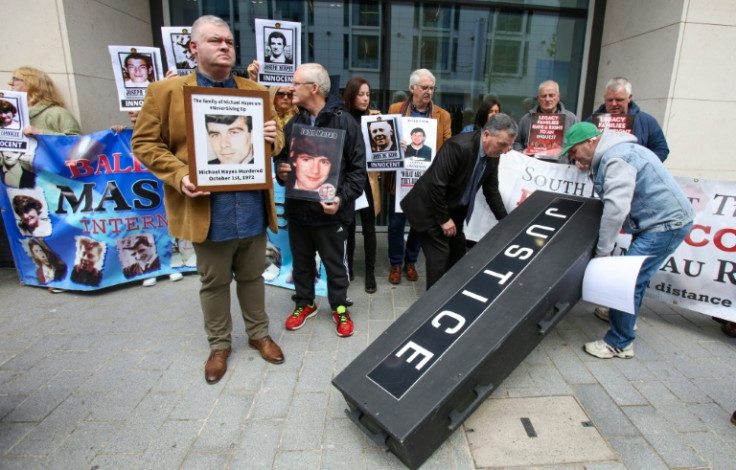Victims' Families Protest At New N.Ireland 'Troubles' Legacy Law

Families of victims of Northern Ireland's "Troubles" protested in Belfast Wednesday against a new UK law that halts coroner's inquests into crimes from the era and grants immunity to past combatants.
A total of 36 inquests involving the deaths of 74 people during the Troubles will not go ahead after the Northern Ireland Troubles (Legacy and Reconciliation) Act 2023 came into force.
Relatives of those who lost their lives said at the demonstration outside the UK government's representative office in Northern Ireland that it extinguished any remaining hopes of justice for their loved ones.
Demonstrators held up a coffin emblazoned with "Justice" and placards reading "Legacy families have a right to an inquest", "Bill of Shame" and "RIP rule of law".
"It's a very dark day for the families and for justice," said Suzanne Kerr, whose grandfather John Kerr was shot dead by British soldiers in Belfast 1971.
Decades later, the Brown family is still waiting for information about what actually happened.
"The message today is clear, we are not giving up, shame on this British Conservative government," Kerr, 39, told AFP.
Ministers say the bill is aimed at drawing a line under the period known as the Troubles, the three decades of unrest in which more than 3,500 people were killed.
Notably, it will halt inquests, civil cases and criminal prosecutions for crimes related to the conflict and grant conditional immunity to former combatants on all sides.
Opponents say its essence is to protect British army and security force veterans who served in Northern Ireland, as well as paramilitaries.
Critics include victims' rights groups, all political parties in Northern Ireland, the United Nations and the EU's Council of Europe.
The law is also the subject of legal challenge in courts in Belfast and Europe.
Amnesty International denounced the new law as "a cliff edge for truth, justice, and accountability for victims of the Northern Ireland conflict" and a "dangerous international precedent".
Earlier this week an international panel of experts led by the Norwegian Centre for Human Rights said it would harm Britain's reputation abroad and could provide authoritarian regimes around the world with a model for similar laws.
Ciaran MacAirt, from victims' rights group Time for Truth, developed that idea in comments to reporters.
"Britain is a serial human-rights abuser, but this blatant attack on our human rights would embarrass tin-pot dictators in the so-called Third World," he said.
"Britain wants to bury its war crimes in Ireland and protect its killers." He called for the new law to be repealed.
From Wednesday, responsibility for all inquiries regarding the Troubles are transferred to a new investigative body, the Independent Commission for Reconciliation and Information Recovery (ICRIR).
At the protest, victims' families said they had little faith that the ICRIR would conduct open and effective probes.

© Copyright AFP 2024. All rights reserved.





















